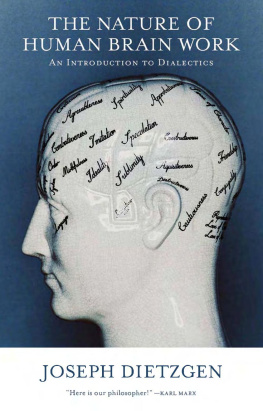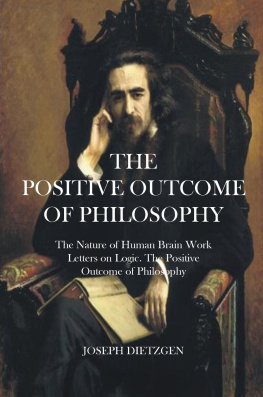Joseph Dietzgen - Social-Democratic Philosophy
Here you can read online Joseph Dietzgen - Social-Democratic Philosophy full text of the book (entire story) in english for free. Download pdf and epub, get meaning, cover and reviews about this ebook. year: 2016, genre: Science. Description of the work, (preface) as well as reviews are available. Best literature library LitArk.com created for fans of good reading and offers a wide selection of genres:
Romance novel
Science fiction
Adventure
Detective
Science
History
Home and family
Prose
Art
Politics
Computer
Non-fiction
Religion
Business
Children
Humor
Choose a favorite category and find really read worthwhile books. Enjoy immersion in the world of imagination, feel the emotions of the characters or learn something new for yourself, make an fascinating discovery.

- Book:Social-Democratic Philosophy
- Author:
- Genre:
- Year:2016
- Rating:4 / 5
- Favourites:Add to favourites
- Your mark:
- 80
- 1
- 2
- 3
- 4
- 5
Social-Democratic Philosophy: summary, description and annotation
We offer to read an annotation, description, summary or preface (depends on what the author of the book "Social-Democratic Philosophy" wrote himself). If you haven't found the necessary information about the book — write in the comments, we will try to find it.
Social-Democratic Philosophy — read online for free the complete book (whole text) full work
Below is the text of the book, divided by pages. System saving the place of the last page read, allows you to conveniently read the book "Social-Democratic Philosophy" online for free, without having to search again every time where you left off. Put a bookmark, and you can go to the page where you finished reading at any time.
Font size:
Interval:
Bookmark:

Source: Joseph Dhring, Philosophical Essays, Charles H. Kerr & Co., Chicago 1906, pp.173-223;
Translated: by Theodor Rothstein & Max Beer;
First published: in Volksstaat, 1876;
Transcribed: by Einde OCallaghan for the Marxists Internet Archive.
I
It is with pride and joy that our comrades look upon the successes achieved in a comparatively short time in the cause of Socialism. The numerous adherents, the large concourse we owe, I think, to the sense of degradation and misery which burns in the hearts of the people. But the splendid discipline, the never-failing tact and the harmonious working of the rank and file we must ascribe to the clear grasp and the systematic comprehension of our theory. Without that the socialist would be to-day what he was heretofore: tender-hearted, but muddle-headed.
The first English and French socialists whose thoughts flashed through the horizon of the end of the eighteenth century, were not slow in recognizing the exploiting and antagonistic character of our champions of free property. They saw the negative element, the taint of the deadly disease, within the heart of the factory system. They foretold with ingenious lucidity the decay of the middle-class, the slow, but inevitable divorce of the peasantry and the artisans from their means of production, the transformation of the small producers into wage-slaves, finally the rapid increase of misery and of the number of the proletarian class. But they failed to recognize that the elements of the positive remedy are to be found in the laws underlying economic developments, and that human history in its evolution does not only bring forth problems, but organically contains their solution. In their purely ideological conception of the world they believed it ought to be possible to invent some scheme for the building up of a true and just society. This error of judgment could not but lead to day-dreaming. Every one of these amiable dreamers looked for proselytes and went with them to America or Icaria. One built up a Harmony, the other a New Jerusalem. There were as many sects as ingenious minds to found them. They exhausted themselves in discussing Republic and Monarchy, dictatorial or constitutional government, limited or universal suffrage, and all the intermediate forms of government. They brandished all manner of flags, two- and three-colored, blue and red ones. However, for logical sequence, scientific consistency and harmonious action, one searched in vain.
Amidst this chaotic state of social and political speculation appeared Marx and Engels who, besides their warm devotion to the cause of the people and to socialism, possessed the necessary philosophic knowledge to clear social science of vague guessings and imaginings and to give it a body of positive doctrines. Philosophy revealed to them the basic principle that, in the last resort, the world is not governed by Ideas, but, on the contrary, the Ideas by the material world. They agreed that the proper forms of government and social institutions are not to be looked for in the inner recesses of the mind, but must be found through the investigation into I the material conditions of a given period. The materials for socialist investigations are supplied by the existing capitalist society with its political economy as the palpable body which consumes and produces concrete commodities.
In his Capital, Marx dissected that body and exposed clearly how our social misery is the necessary result of an economic system whose plentiful production by social labor stands in glaring contradiction to its mode of private usurpation. The small number of employers and their set receive as interest, rent, dividend, etc., the whole profit, while the workmen receive a wage, a kind of lubricant to keep the social machinery going. Marx was the first to recognize that, on the whole, human welfare does not depend on the enlightened statesman, but on the productivity of social labor. He recognized that the productive forces and the efficiency of society are by the nature of things impelled to expand, that this expansion led us from barbarism to civilization, that the progress of economic productivity must necessarily lead us out of the glaring contradictions of civilization to the socialist state, to communist liberty, equality and fraternity. He recognized and this recognition is the bedrock of social science that human salvation depends on material work and not on spiritualist moonshine. Henceforward we look for salvation not to religious, political and judicial enlightenment, but we see it organically growing out of the development of social economy. Science or education can not bring it; productive labor must do it, which, through science and education, can be made more productive.
To which does the primacy belong; to mechanical work, or to mental speculation? Thats the question. At the first sight it might appear to be a scholastic conundrum; yet, for the purpose of gaining a clear mental vision, it is of vital importance to solve it. The question is, indeed, an old one; who is right, the idealist or the materialist; but now the question has been so far cleared up that there can be no doubt as to the answer. We, of course, are materialists and thus acknowledge the material factors to have the primacy. Our opponents brand us, therefore, as enemies of culture. In reality we are only opponents of those dreamers who divorce scientific training from material work, making out of the former something supernatural which transcends all laws of mechanics. Science and education are in our eyes very valuable means, but means only, while the productivity of labor is the higher end. It is in the first instance the necessity for an ever increasing productivity of labor which forms the real impulse of scientific investigation and progress. In the second instance, of course, science reacts most beneficially on the method of labor.
Yet the question as to where the primacy belongs has a more comprehensive meaning. It involves the cardinal problem, is the world created by some monstrous, transcendental schemer, or is our scheming, though no doubt of considerable importance to us, quite a secondary attribute of the monstrous every-day world; we want to know which takes the precedence: thought or being, speculative theology or inductive science. Men are, and have a right to be, proud of their intellect, but it is puerile to give to a thing, which appears to them of primary importance, the primacy of the world. Idealists we call those who exaggerate, idolize the worth of human understanding, turning it into a religious or metaphysical hanky-panky. This school is on the decrease, its last survivals are those who have long ago given up all religious superstitions, but somehow stick to the belief that conceptions of freedom, justice, beauty, etc., are shaping human destiny. To be sure, there is a certain truth in that; but in the first instance it is the material world which forms the substance of our conceptions, which determines what is meant by freedom, justice, etc. It is, as we have said before, of vital importance that we should be clear about that, for on it depends the method of giving our conceptions the proper meaning. Indeed, the question as to which is primary, mind or matter, contains also the problem as to the right way to justice and truth.
Impelled by material necessity, Socialists look for the salvation of humanity. Philosophic thought based on facts has given us the guide. We find salvation not in idealistic shuffling, but in the material production. If the nature of things demands that we should get the maximum of result in the minimum of time, then we must work as bourgeois society does: with colossal machinery and for a large public. The small workshop and the small holding must go. The great capitals shall flourish. Thats the work of our liberals, and they have done it so well, that our Empire, our free institutions, our parliamentary talking shop, our party discussions about free trade and protection, our no-popery-struggles and other Bismarckian tricks are no more able to master it.
Next pageFont size:
Interval:
Bookmark:
Similar books «Social-Democratic Philosophy»
Look at similar books to Social-Democratic Philosophy. We have selected literature similar in name and meaning in the hope of providing readers with more options to find new, interesting, not yet read works.
Discussion, reviews of the book Social-Democratic Philosophy and just readers' own opinions. Leave your comments, write what you think about the work, its meaning or the main characters. Specify what exactly you liked and what you didn't like, and why you think so.




